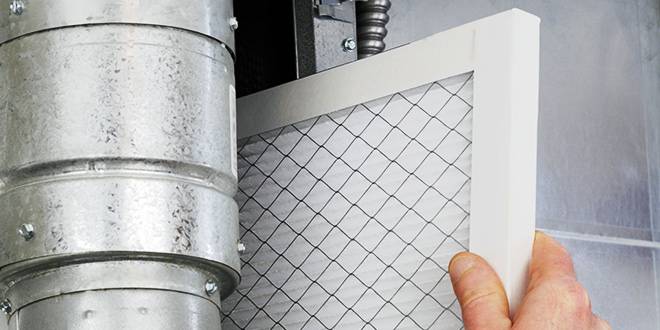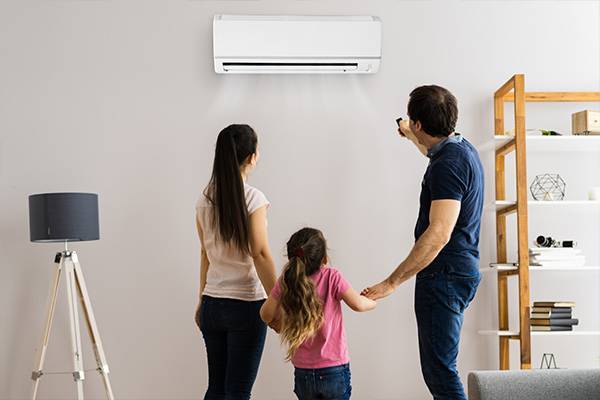
For Mansfield, TX residents and business owners, ensuring healthy indoor air quality is crucial. Learn about effective, professional air quality testing methods with our guide. It’s designed to meet your unique environmental needs, offering safe, expert solutions for maintaining a healthy indoor atmosphere.
How to Test Indoor Air Quality in Mansfield, TX
Ensuring healthy indoor air quality (IAQ) in Mansfield, TX, is a task best left to professionals, given the complexities and potential risks involved. Here’s how our HVAC experts approach the process of testing and assessing IAQ in your home or business:
1. Mold and Mildew Inspection
Regularly inspecting areas prone to moisture, such as bathrooms, kitchens, and basements, is crucial for early detection of mold and mildew. These growths are not only detrimental to structural integrity but also to air quality, as they release spores and toxins into the air. Identifying and promptly addressing mold and mildew can prevent these adverse effects.
2. Humidity Level Assessment
Maintaining the right humidity level is essential for both comfort and health. Indoor humidity should ideally be kept between 30% and 50%. Levels outside this range can lead to problems like mold growth or overly dry air, which can irritate respiratory systems. An indoor air quality monitor helps in making necessary adjustments, such as using dehumidifiers or humidifiers, to maintain optimal levels.
3. Airborne Particle Measurement
Utilizing advanced equipment to measure the concentration of dust and other particulates in the air is vital. These particles, if not properly managed, can aggravate respiratory conditions and reduce overall air quality. Regular assessments help in determining the appropriate time for replacing air filters or cleaning the HVAC system’s ductwork to ensure efficient air filtration and circulation.
4. Carbon Monoxide Detection
Carbon monoxide is a silent but deadly gas. Installing carbon monoxide detectors, particularly in areas near heating systems or garages, is essential for early detection and prevention of carbon monoxide poisoning. These detectors are crucial in spaces with fuel-burning appliances.
5. Radon Testing
Radon is an invisible and odorless gas that can pose serious health risks. Regular testing for radon, especially in lower levels of buildings, is important for ensuring that radon levels are within safe limits. This is particularly critical in areas known for high radon prevalence.
6. Ventilation System Evaluation
A well-functioning HVAC system and adequate ventilation are key to maintaining good indoor air quality. Regular checks of the HVAC system, including filters and ductwork, along with ensuring that exhaust fans in bathrooms and kitchens are working efficiently, play a significant role in removing indoor air pollutants and supplying fresh air.
7. Volatile Organic Compounds (VOCs) Testing
Many common household items emit VOCs, which can be harmful in high concentrations. Using VOC meters to regularly check the levels of these compounds can help identify sources of VOCs and take steps to reduce their presence, such as opting for low-VOC products.
8. Allergen Detection
For individuals with allergies, exposure to common allergens like pet dander, pollen, and dust mites can significantly impact comfort and health. Testing for these allergens helps in implementing specific measures, like regular cleaning and using air purifiers, to reduce their presence in the indoor environment.
9. Comprehensive Air Quality Assessment
A thorough evaluation of air quality encompasses examining a variety of contaminants and assessing the overall performance of the HVAC system. This comprehensive approach ensures that all aspects of air quality are addressed, leading to a healthier indoor environment.
10. Ongoing HVAC Maintenance
Consistent maintenance of the HVAC system is fundamental to sustaining good air quality. Regular cleaning, servicing, and timely repair of the HVAC system ensure it operates efficiently, providing effective filtration and circulation of indoor air.

These steps, when undertaken regularly, can help maintain a healthy and comfortable indoor environment, especially in areas like Mansfield, TX, where environmental factors can significantly influence indoor air quality.
Can I Do An Indoor Air Quality Test Myself?
Yes, you can perform basic indoor air quality tests yourself using available DIY test kits for certain parameters like mold, radon, or carbon monoxide. However, these kits have limitations and might not provide a comprehensive analysis. For a more detailed and accurate assessment, it’s recommended to seek professional testing services.

Why Is Indoor Air Quality Testing Important?
Indoor air quality testing is crucial because poor air quality can lead to health issues like allergies, respiratory problems, and long-term diseases. It also helps identify hidden problems in your home, like mold growth or harmful gas leaks, ensuring a healthier and safer living environment.
Are DIY Quality Tests Accurate?
DIY tests can provide a basic understanding of certain aspects of indoor air quality. However, their accuracy is generally lower compared to professional testing. They may not detect all types of pollutants and often lack the precision required for comprehensive analysis. For more accurate and reliable results, professional testing is advisable.
How Often Should You Test Air Quality in Your Home?
Ideally, indoor air quality should be tested at least once a year. However, it might be necessary to test more frequently if there are specific concerns like recent renovations, the presence of health symptoms that suggest poor air quality, or if you live in an area with known environmental pollutants.
What Contaminants Can Affect Indoor Air Quality?
Several contaminants can affect indoor air quality, including mold, dust mites, pet dander, pollen, volatile organic compounds (VOCs) from paints and cleaning products, carbon monoxide, radon, and tobacco smoke. Each of these can have varying effects on health and comfort.
What Are The Common Signs Of Poor Indoor Air Quality?
Common signs include persistent odors, humidity issues, visible mold growth, excessive dust, and health symptoms like headaches, fatigue, dizziness, irritation of the eyes, nose, throat, and skin, and worsening of allergy and asthma symptoms.
Can Plants Improve Indoor Air Quality?
Yes, certain indoor plants can improve air quality by removing some pollutants and producing oxygen. However, they are not a substitute for proper ventilation and regular air quality testing, as they have limited effectiveness in removing all types of air pollutants.
What Steps Can I Take To Improve Indoor Air Quality?
To improve indoor air quality:
- Ensure good ventilation
- Use an air purifier
- Install carbon monoxide detectors
- Maintain optimal humidity levels
- Regularly clean and vacuum
- Avoid smoking indoors
- Use natural or low-VOC products
- Promptly address any water leaks or mold growth
Remember, regular HVAC maintenance also plays a significant role in maintaining clean indoor air.
Breathe Easy with Expert Assistance 👃🍃🏡
If concerns about your indoor air quality are growing, it’s time to take action. Reach out to our team at C&S Air for comprehensive air quality testing and solutions. We’re here to ensure your home or business in Mansfield, TX enjoys the highest standards of air purity and comfort. Contact us today for a healthier tomorrow.
